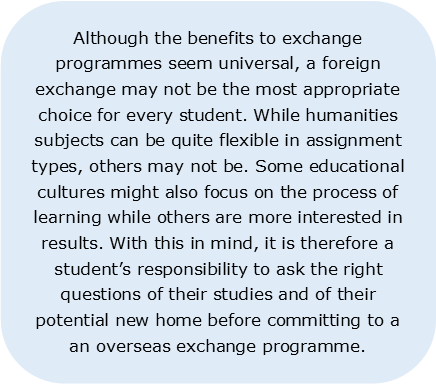What are 6 considerations for foreign exchanges?

This is the third and final chapter about Exchange Programmes. To complete this course, read each chapter carefully and then unlock and complete our materials to check your understanding.
– Remind the reader about the benefits of foreign exchanges
– Explore 6 considerations that students should make when enrolling on an overseas exchange
– Provide worksheets and activities to measure, progress, understanding and success
Chapter 3
When considering an exchange programme, it would seem that the opportunity to improve language and study skills and experience new cultures can only have a positive impact on a student’s degree or future CV. However, not all exchange programmes offer such quintessential locations as Italy or Spain, nor do they necessarily all offer a culturally warm welcome. There are in fact several potential issues that may arise on any exchange programme, and in this final chapter of our short reader we explore six of the most important considerations that students should make. Read these six carefully and you may very well be able to avoid experiencing that ‘foreign exchange from hell’.


Consideration 1: Assessments
If you’ve enrolled on an exchange programme which runs through the academic semester, it’s likely going to impact your grades. You may find you are graded according to your home university’s marking system, but if you aren’t then you will likely have to adhere to different marking criteria – be prepared for this. Be prepared also for the possibility that a foreign university might not be able to offer an equal amount of credits or may not require a particular exam type, such as lab work, which is crucial for passing the degree. As a result, there may be a need to extend your bachelor’s or master’s degree once home to fulfil these requirements.
Consideration 2: Instruction Style
In addition to transferable grades, students can also struggle when the style of teaching is significantly different to what they’re used to. Perhaps the teaching practices are too different or the demands of studying in a second language are too difficult. Depending on the partner university, students may have their exchange classes delivered in that country’s language, or they may alternatively be in English (regardless of the native language) to accommodate for an international cohort. Finding out your study language is an important step to managing your expectations, and importantly, your likelihood of facing challenges when studying.

Consideration 3: Rules and Regulations
It’s also important for a potential exchange student to ask the right questions about what’s expected of them in their new home. These expectations can be legal ones, such as whether a student visa prohibits something ordinary such as driving a car or working part-time, to university regulations regarding a code of conduct or curfew. These expectations may also be societal or cultural: If you’re staying with a host family for example, what rules will that family likely have? Is the country you are visiting likely to prohibit any public behaviours which are considered quite acceptable in your own country, such as on the clothes you wear?

Consideration 4: Location, Location, Location
Before committing to an exchange based solely on current impressions of a country, students should also do some deeper research into exactly where they’re going. There should be plenty of blogs and forums online of students who have already undertaken a similar exchange in that location or have been living in that country for work rather than touristic reasons. It’s always invaluable to get helpful outsider insights offering a window into a country. As well as personal experiences, it’s also advised to read a little about the main historical and cultural events in the surrounding region. By learning about a country’s customs and understanding why they exist, a new arrival can better prepare for what to expect in terms of greetings, food and festivals. Significantly, having a base knowledge of a country’s religious and political preferences and practices may be a crucial factor in influencing the choice to go there and any expectations of life once there.
Consideration 5: Loneliness
This point seems avoidable, but at times loneliness when abroad can be very hard to escape. Students can experience homesickness when simply moving to a university in the same country, and it’s certainly more common on foreign exchange programmes. Whether it’s missing the comfort of familiar friends and family or food and culture, living abroad can be an isolating experience at times. It’s likely that those who are shy will experience loneliest the most, so if that sounds like you then be prepared to be courageous and reach out to peers in your cohort for social events.

Educational institutes tend to be full of outgoing and welcoming individuals who are also looking to form new relationships. Find people who have similar interests regardless of cultural differences, such as in music or literature, or join a sports team where actions speak louder than words. You may even wish to arrange in-class study groups at more social locations, such as in coffee shops and restaurants.

Consideration 6: Hidden Costs
Finally, the last point to consider is the practical costs of an exchange programme. Although in some cases these exchanges can be considerably cheaper than paying foreign student fees, there may be unconsidered additional expenses to think about. If you pay dorm fees at home for example, compare these to the amount you’ll likely be paying at your destination country. At home, it may be surprising just how often family members drop by to take you out for a meal or to help with grocery shopping – and these costs add up, so remember to factor them in.
Now that you’ve finished reading through these considerations and have completed this short course, consider unlocking and completing the related worksheets to see how much of our advice about exchange programmes you remember.
To reference this reader:
Academic Marker (2022) Exchange Programmes. Available at: https://academicmarker.com/careers-advice/getting-experienced/exchange-programmes/ (Accessed: Date Month Year).
Downloadables
Once you’ve completed all three chapters in this short reader about Exchange Programmes, you might then wish to download our Chapter Worksheets to check your progress or print for your students. These professional PDF worksheets can be easily accessed for only a few Academic Marks.
Chapter 1 explores the topic: What are university exchange programmes? Our Chapter 1 Worksheet (containing guidance, activities and answer keys) can be accessed here at the click of a button.
Chapter 2 explores the topic: What are 8 benefits of academic exchanges? Our Chapter 2 Worksheet (containing guidance, activities and answer keys) can be accessed here at the click of a button.
Chapter 3 explores the topic: What are 6 considerations for foreign exchanges? Our Chapter 3 Worksheet (containing guidance, activities and answer keys) can be accessed here at the click of a button.
To save yourself 2 Marks, click on the button below to gain unlimited access to all of our Exchange Programmes Chapter Worksheets. This All-in-1 Pack includes every chapter, activity and answer key related to this topic in one handy and professional PDF.
Collect Academic Marks
-
100 Marks for joining
-
25 Marks for daily e-learning
-
100-200 for feedback/testimonials
-
100-500 for referring your colleages/friends